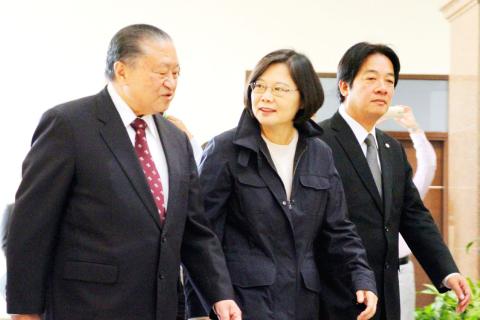President-elect Tsai Ing-wen (蔡英文) yesterday said electricity prices would be adjusted for industrial users, but no adjustments are planned for household users, as she met with Delta Electronics Inc (台達電) founder Bruce Cheng (鄭崇華) in Tainan as part of her ongoing tour of Taiwanese industries.
Rates for industrial users would be adjusted according to the economy, seasonal factors and demand, while companies would be offered incentives to curb their energy use, Tsai said, before she took aim at inaccurate reporting on her campaign pledge that there would be no substantial electricity price rise for 10 years.
“I do not mean to blame the media, but my idea was simplified to give the impression that electricity prices would not be raised in 10 years. Our electricity pricing strategy is based on the principle of maintaining a minimum monthly charge, while adjusting prices according to commodity prices and consumers’ ability,” Tsai said.

Photo: CNA
The Democratic Progressive Party (DPP) believes that general electricity prices could remain stable over the next decade for three reasons: improved energy conservation and energy efficiency; reduced costs of renewable energy with technology advancement and increasing scale of production; and an amendment of the Electricity Act (電業法) to facilitate power industry liberalization and boost Taiwan Power Co’s (台電) efficiency to bring down electricity prices, she said.
“I know Cheng cares about electricity prices, and I believe we have a consensus on the issue. It is a matter of overall energy policy planning, and there must be a reasonable and sustainable energy policy for Taiwan,” Tsai said, referring to Cheng’s comment in December last year that “anyone promising no electricity price hike is cheating voters.”
Tsai added that establishing a sustainable system is key to building a nuclear-free nation by 2025 and creating a stable domestic market.
After a closed-door meeting with the DPP leader, Cheng described their discussion as “satisfying,” but said that he still had doubts about her proposals.
“We should not put her in a difficult situation, but not raising electricity prices is impossible and there should be a reasonable pricing mechanism,” he said.
“Taiwan imports almost all its energy, so what makes it able to supply the cheapest electricity in the world? It simply cannot. Our electricity prices are not much higher than the nations with the lowest prices, and other nations have prices many times higher than ours,” Cheng said.
Electricity and water rates should have already been raised, even if that means extra costs for his company and others.
Cheng said he was telling the truth and not speaking for any party, and that while what he said might be badly received, he would still speak his mind.

DEMOGRAPHICS: Robotics is the most promising answer to looming labor woes, the long-term care system and national contingency response, an official said Taiwan is to launch a five-year plan to boost the robotics industry in a bid to address labor shortages stemming from a declining and aging population, the Executive Yuan said yesterday. The government approved the initiative, dubbed the Smart Robotics Industry Promotion Plan, via executive order, senior officials told a post-Cabinet meeting news conference in Taipei. Taiwan’s population decline would strain the economy and the nation’s ability to care for vulnerable and elderly people, said Peter Hong (洪樂文), who heads the National Science and Technology Council’s (NSTC) Department of Engineering and Technologies. Projections show that the proportion of Taiwanese 65 or older would

Nvidia Corp yesterday unveiled its new high-speed interconnect technology, NVLink Fusion, with Taiwanese application-specific IC (ASIC) designers Alchip Technologies Ltd (世芯) and MediaTek Inc (聯發科) among the first to adopt the technology to help build semi-custom artificial intelligence (AI) infrastructure for hyperscalers. Nvidia has opened its technology to outside users, as hyperscalers and cloud service providers are building their own cost-effective AI chips, or accelerators, used in AI servers by leveraging ASIC firms’ designing capabilities to reduce their dependence on Nvidia. Previously, NVLink technology was only available for Nvidia’s own AI platform. “NVLink Fusion opens Nvidia’s AI platform and rich ecosystem for

Taiwan Semiconductor Manufacturing Co (TSMC, 台積電) yesterday said it is building nine new advanced wafer manufacturing and packaging factories this year, accelerating its expansion amid strong demand for high-performance computing (HPC) and artificial intelligence (AI) applications. The chipmaker built on average five factories per year from 2021 to last year and three from 2017 to 2020, TSMC vice president of advanced technology and mask engineering T.S. Chang (張宗生) said at the company’s annual technology symposium in Hsinchu City. “We are quickening our pace even faster in 2025. We plan to build nine new factories, including eight wafer fabrication plants and one advanced

‘WORLD’S LOSS’: Taiwan’s exclusion robs the world of the benefits it could get from one of the foremost practitioners of disease prevention and public health, Minister Chiu said Taiwan should be allowed to join the World Health Assembly (WHA) as an irreplaceable contributor to global health and disease prevention efforts, Minister of Foreign Affairs Lin Chia-lung (林佳龍) said yesterday. He made the comment at a news conference in Taipei, hours before a Taiwanese delegation was to depart for Geneva, Switzerland, seeking to meet with foreign representatives for a bilateral meeting on the sidelines of the WHA, the WHO’s annual decisionmaking meeting, which would be held from Monday next week to May 27. As of yesterday, Taiwan had yet to receive an invitation. Taiwan has much to offer to the international community’s